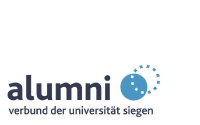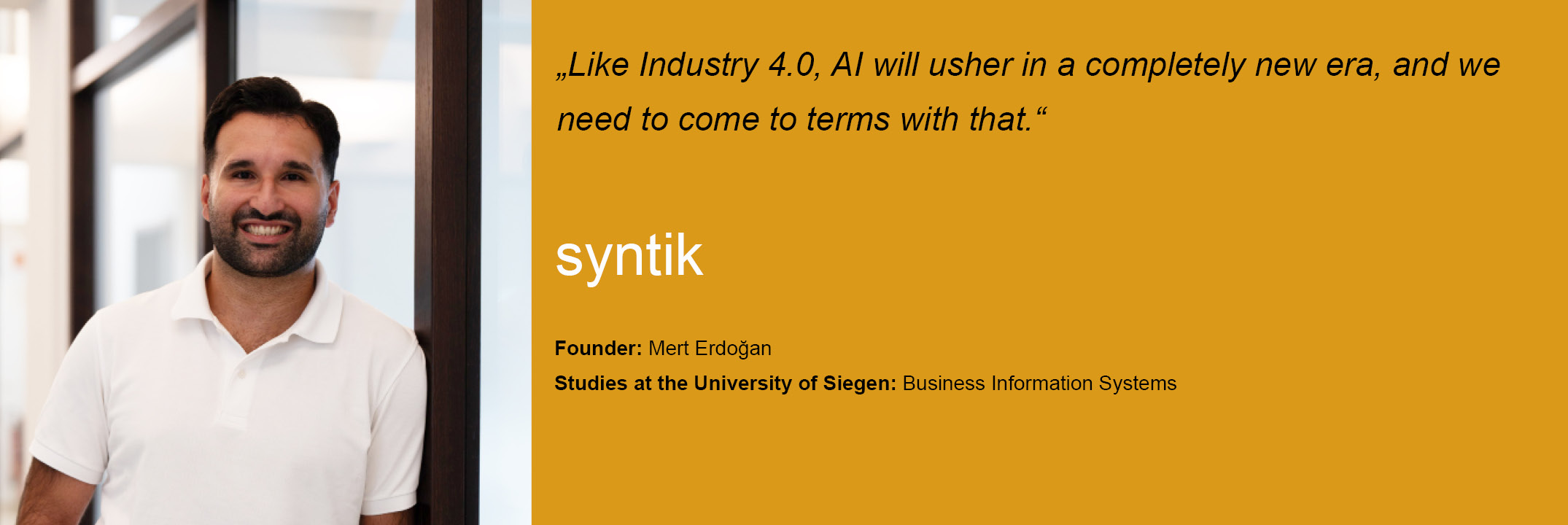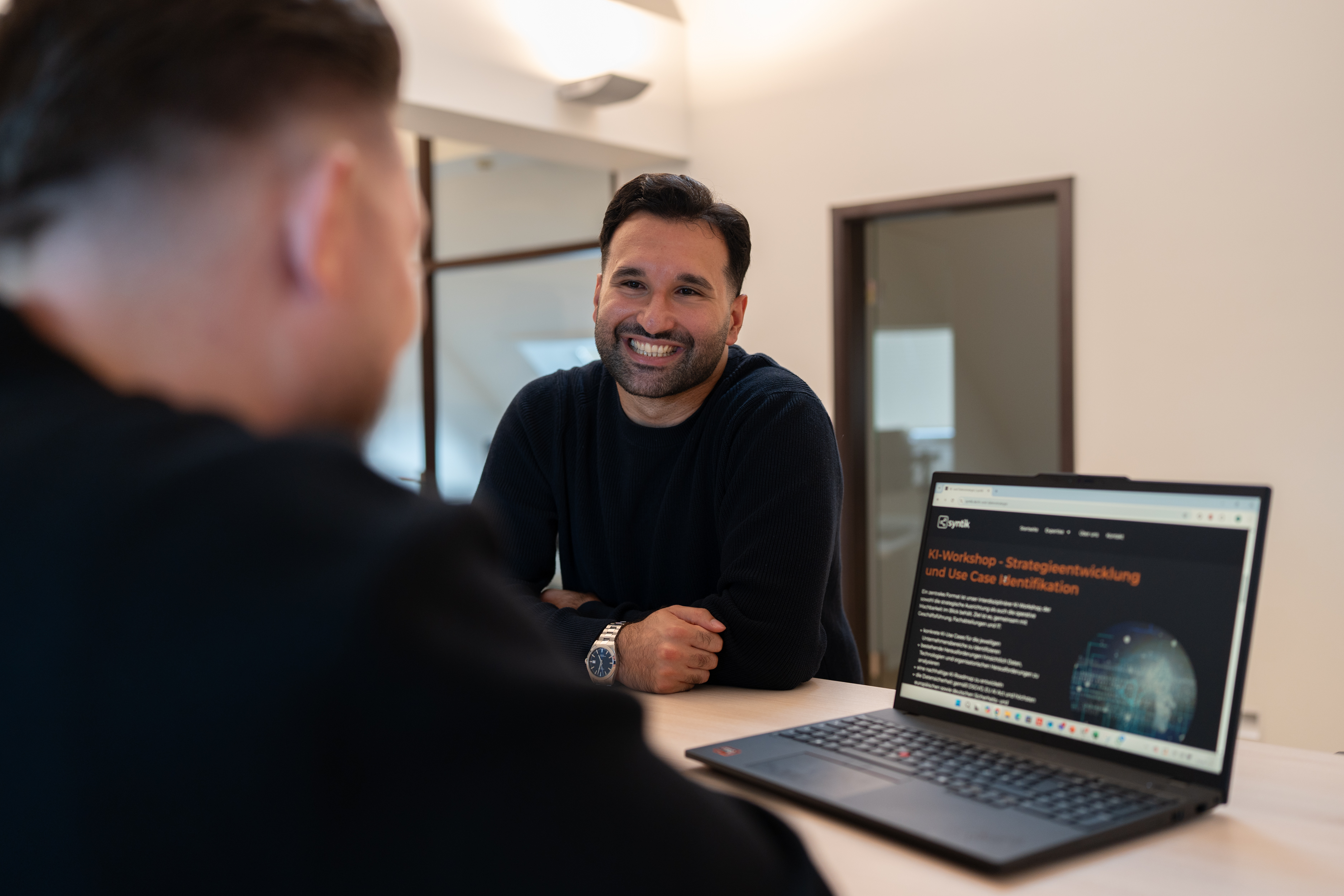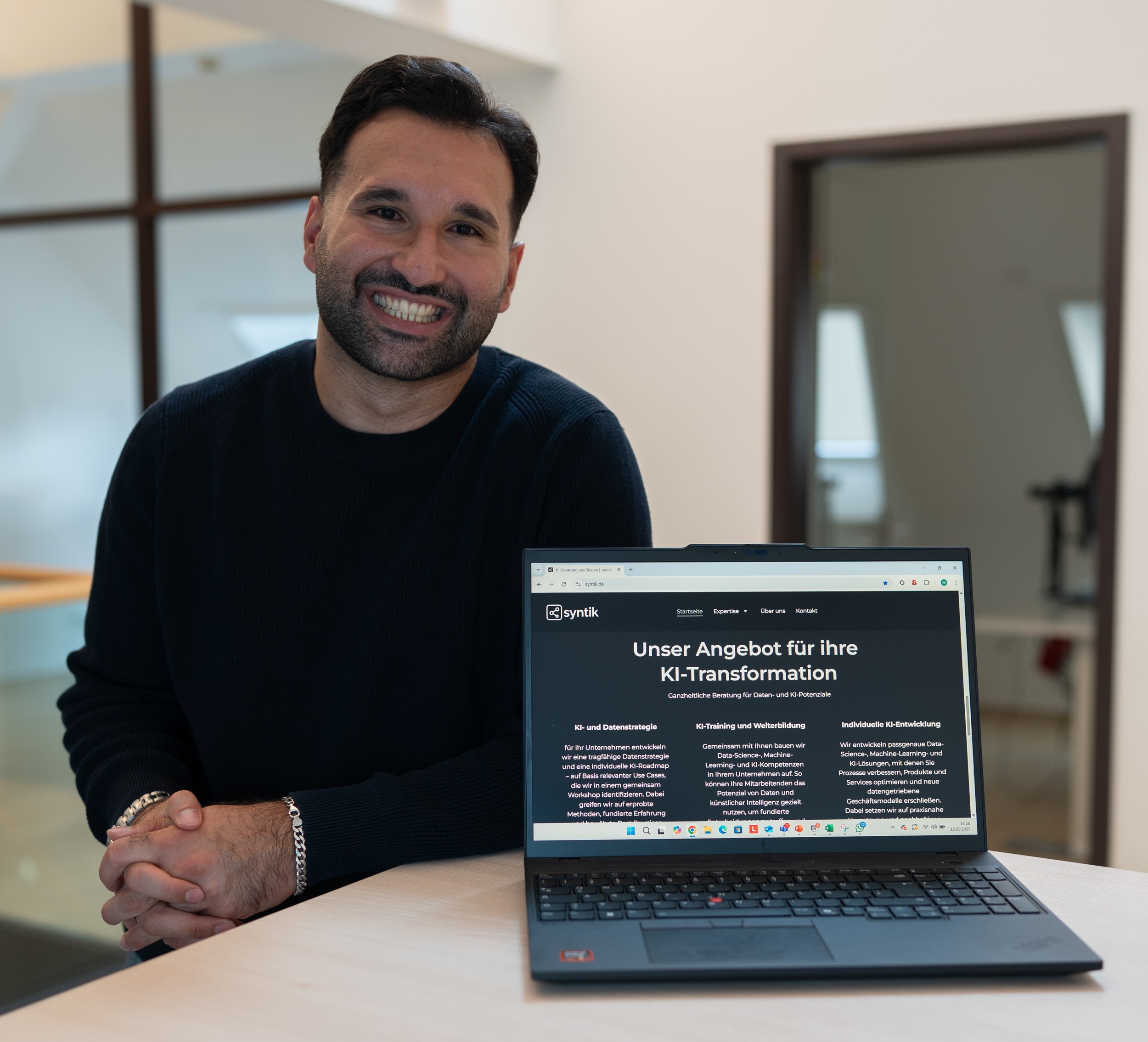syntik
Mert Erdoğan, who was born in the Siegerland region, is the founder of the start-up syntik gmbH. In his AI workshops, he not only teaches the basics of AI, but also shows medium-sized companies how they can benefit from the fair use of artificial intelligence.
What is syntik?
With syntik, I offer classic IT services. Among other
things, this involves introducing customers to AI through
workshops. We look at what options we have, what added value it
offers for the commercial sector, and how we can use it to
transform small and medium-sized businesses. I use existing
tools or develop customised solutions, depending on the scale
of the problem.
Ultimately, AI is about analysing data, recognising patterns
and using this information to make decisions. This could be
automated quotation generation or a company that participates
in a lot of tenders or wants to compare something with its
internal checklist. The aim is to automate all repetitive
processes, i.e. processes that are repeated over and over again
and do not require creativity. This is the approach taken by AI
and syntik.
Can you give an example of how you help companies become more efficient through automated processes?
For example, if we have a chatbot for a service that answers certain incoming enquiries on its own. Sometimes you talk to an assistant, and at some point, when the limit is reached, the person behind it comes in and handles the case completely. We can't always automate and digitise everything 100%, but only to a certain extent, if necessary. And all these use cases, be it a chatbot in service, automatic quotation creation, tender comparison when participating in tenders as a company. Automating this process, which takes three hours, so that it only takes 15 minutes. That's the approach: saving time so that the capacity that is freed up can be used for other areas.
What is special about your start-up?
What makes syntik special, its unique selling point, is that
we focus on small and medium-sized enterprises (SMEs) while
also bringing the experience of large companies to the table.
We have the experience and understand how processes work in
large companies. Because we know the approaches and have this
expertise, we can transfer it to SMEs and then assess how much
added value it really brings. If we create solutions that are
far too expensive and overrated, they will ultimately be of
little use, whereas if we have solutions that directly add
value, we can focus on the whole hype surrounding ChatGPT.
For two or three years now, everyone has been talking about
ChatGPT, but many are asking themselves: How do I know exactly
what I can do with it in my company? What is compliant with
data protection regulations, what is repetitive, what is not;
should I invest money in it at all? These are the approaches we
are pursuing and, in my opinion, no one else in
Siegen-Wittgenstein is doing this.
We stay away from production and the areas of hardware and
sensor technology, which require a high level of investment, as
I already discovered in other projects back then. That's why we
said we would focus on what we can do and what we know, namely
the purely commercial side of things, and that's where we see
our USP, especially in the region.
What constitutes a medium-sized company?
Basically, there are traditional SMEs, lower-tier SMEs and upper-tier SMEs. When we talk about SMEs in our case, we are always referring to companies with 50 or more employees, which means that companies with fewer than 50 employees tend to be smaller businesses. These are less interesting to us because the problem is that individual AI solutions are expensive and cost-intensive, and these cannot be expected of companies for which ready-made solutions are more relevant. That does not mean that we do not also recommend ready-made AI solutions for medium-sized businesses. Sometimes that is enough, because even ready-made solutions have an accuracy rate of 80%. So it really depends on the use case, and the limit is then up to 5,000 employees, because that is where the upper SME segment ends. From there, it moves into the realm of large companies, which we steer clear of because we ourselves are too small for that and would lose our focus.
When did you decide to become self-employed?
I have always been interested in digital solutions. I
studied business informatics because I always wanted to use
digital solutions to change the economy and society, as these
opportunities have a truly significant impact on people. I knew
that at some point I wanted to develop or market something.
Here in the region, I hear time and again from my own circle
that there is little knowledge about the use and possibilities
of AI. So I thought to myself, I'm here, I can take the risk.
I'm interested anyway. So the urge was definitely there to do
something in the future, but the timing was also due to the
situation.
Were there any seminars at the University of Siegen that you now benefit from in your company?
During my studies, I learned the basics: what is AI? What
can AI do? What is machine learning and deep learning? All
these elements come from the theory I learned during my
studies, as well as from practical projects at university.
There are modules in business informatics that deal with
processes, understanding processes, designing them and
optimising them, just as we do today. But there were also
computer science subjects at the same time. I remember the
programming internship well, where we developed our own
solutions and games. That's where I gained my first knowledge
of object-oriented development. Fortunately, I already had a
strong practical focus at university, both technically and
economically, i.e. investment, financing and accounting.
How would you describe a typical working day for you?
Unfortunately, there is no such thing as normal at the
moment. I am currently heavily involved in sales.
We don't just offer AI solutions, we also run workshops. That
means we have to make AI tangible, so I first have to show the
region what's available. To do that, I do traditional cold
calling. I go to the Chamber of Industry and Commerce and reach
out to my network. I do a lot of marketing. When I arrive here
in the morning, I start with sales and then work through my
emails. I take care of marketing once or twice a week and also
prepare for appointments.
What do companies learn from the AI workshops you offer?
In the workshops, companies first learn what AI is, what it
can do exactly, and what best practices exist in their
respective industries, whether in retail, manufacturing, or
chemicals. I focus on all industries except finance and
medicine, because those are highly regulated industries. But
apart from that, we look at best practices, the AI solutions
that are already available, what the AI law looks like, what
role the EU AI Act plays legally, and how to build your own AI
assistants. You will also learn how to create your own GPT and
use it in a GDPR-compliant manner.
At the end of the workshop, we work with the specialist
departments, such as purchasing and sales, to identify which
processes are repetitive. We then try to identify use cases,
i.e. real-life applications, such as creating a quote or a
chatbot in customer service, and then we prioritise these use
cases according to technical feasibility and, based on that, we
start with an AI solution. So the AI workshop really needs to
be viewed holistically, from what AI is to what we can
implement for the company.
You have just launched your start-up. What challenges are you currently facing?
Bringing AI closer to people. Many hear about AI, many see
AI, but they find it difficult to understand exactly where the
added value lies. I see explaining this added value as my most
important task at the moment. So I don't see the problem as
being that no appointments are taking place. I am fortunate
that many people are open to the topic. Especially because we
are from the region ourselves, I notice the regional support.
The real challenge is to convince people during appointments of
the added value AI has for them, because they are often afraid
to invest in something when they are not 100% sure that the
added value will be directly returned. That is still a bit
difficult in the region. My goal is to make AI accessible and
convey a feeling of security.
What do you like most about this job or this industry in general?
I am fascinated by IT and AI topics. I am interested in automating processes that are not necessary, which robots will be able to take over in 10 or 20 years. This will give us more freedom and capacity for other tasks that interest us much more and do not bore us in our everyday lives. At the beginning of my consulting career, for example, I spent three weeks filling out a simple Excel spreadsheet, completely manually. I don't think that's necessary anymore these days.
What advice would you give to young entrepreneurs who want to start their own business?
I struggled a bit at the beginning. I was on my way to
becoming a manager and had a great position. Taking this leap
into the unknown, without any clear customers and without any
security, is the biggest leap that many people are unwilling to
take.
My recommendation is that if you have a certain amount of
financial security and can take the risk for six months to do
something you believe in and enjoy, you should always take that
step. A very good friend of mine, who has his own start-up,
always said, ‘Just start, you'll figure out the rest.’ So have
confidence in yourself and just start.
What is your goal with syntik?
I want to make AI more accessible to the region, businesses
and people. With syntik, I want to support companies so that
they are on an equal footing with other countries and
continents. I know how it works in America, in the US and
China.
In Germany, little is invested in AI because people are afraid.
I want to make AI accessible and create added value so that we
can develop both culturally and economically. We have AI in
production, but in commercial processes such as controlling,
accounting, sales and purchasing, we are still very manual and
repetitive, and LLMs, or large language models, are hardly
used. We need to develop further in this area, otherwise even
more companies will have problems generating sufficient revenue
and establishing themselves in this era.
Like Industry 4.0, AI will create a whole new era, and we need
to address that.
This portrait is based on an interview with Mert Erdoğan and was written by Duygu Cicek.
Click here for the start-up's homepage.




